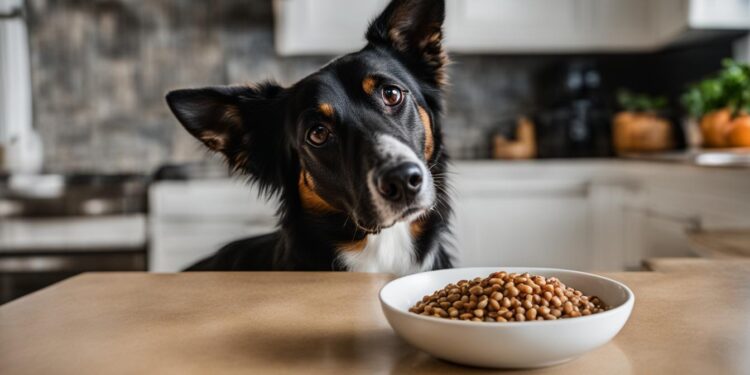Cooked Black Eyed Peas: Are They Safe for Dogs?

When it comes to our furry friends, we always want to make sure we’re feeding them safe and nutritious foods. If you’ve ever wondered whether dogs can eat cooked black eyed peas, you’re in the right place. In this article, we’ll explore whether black eyed peas are a dog-friendly legume and the precautions to keep in mind when introducing them to your pup’s diet. So, let’s dive in and find out!
Key Takeaways:
- Cooked black eyed peas can be a safe and nutritious option for dogs when prepared properly.
- Black eyed peas are a dog-friendly legume and can provide essential nutrients like fiber, protein, and vitamins A and C.
- Avoid adding any seasonings or spices to black eyed peas when cooking for your dog as certain ingredients can be harmful.
- Introduce new foods gradually and monitor your dog for any adverse reactions, especially if they have existing health conditions or dietary restrictions.
- Consult with your veterinarian before making any changes to your dog’s diet or introducing new foods.
Benefits of Cooked Black Eyed Peas for Dogs
Cooked black eyed peas can offer several benefits to dogs. They are a good source of dietary fiber, which can support healthy digestion and regulate bowel movements. The protein content in these legumes is also beneficial for dogs, as it contributes to muscle development and repair. Additionally, black eyed peas contain vitamins and minerals that can support a dog’s immune system and help maintain healthy skin and coat. However, it’s important to remember that black eyed peas should only be a part of a balanced canine diet and not the sole source of nutrition.
When it comes to a dog’s diet, variety and balance are key. While black eyed peas can provide certain nutrients, it’s crucial to ensure that dogs receive a well-rounded meal plan that includes other essential food groups. Incorporating a variety of high-quality proteins, carbohydrates, and fats is important for meeting a dog’s nutritional needs. Alongside black eyed peas, other safe foods for dogs include lean meats, poultry, fish, whole grains, and vegetables.
“Black eyed peas can be a healthy addition to a dog’s diet, but they should be consumed in moderation and as part of a well-balanced meal plan,” says Dr. Sarah Thompson, a veterinarian at Animal Care Clinic. “Dogs have specific dietary requirements, and it’s important to meet those needs to ensure optimal health and well-being.”
Incorporating black eyed peas into your dog’s diet can provide a range of benefits. The fiber content can promote healthy digestion and prevent constipation, while the protein helps with muscle maintenance and repair. The vitamins and minerals in black eyed peas can support immune function, leading to a healthier dog overall.
Precautions and Considerations When Feeding Black Eyed Peas to Dogs
While cooked black eyed peas can be safe for dogs, there are some precautions and considerations to keep in mind. It’s important to ensure that the legumes are cooked thoroughly to make them easier to digest for dogs, as raw or undercooked legumes can be tough on their digestive system, potentially causing upset stomachs.
Additionally, it’s crucial to avoid adding any seasonings or spices to the black eyed peas when preparing them for your canine companion. Ingredients such as salt, onion, and garlic can be highly toxic to dogs and should be completely avoided. It’s always better to serve the legumes plain, without any added ingredients.
If your dog has a history of digestive issues or is prone to allergies, it’s advisable to introduce black eyed peas gradually into their diet. Monitor their reaction closely and watch for any signs of gastrointestinal upset or allergic reactions, such as vomiting or diarrhea. If any adverse symptoms occur, it’s best to discontinue feeding black eyed peas and consult with your veterinarian for further advice.
“When feeding cooked legumes like black eyed peas to dogs, it’s essential to prioritize their safety and well-being. By following these precautions and considering the individual needs of your dog, you can incorporate legumes into their diet responsibly.”
Benefits of Cooking Black Eyed Peas for Dogs
“Properly cooked black eyed peas can offer numerous benefits to dogs, making them a valuable addition to their diet.”
- Rich in dietary fiber, which aids in digestion and regulates bowel movements.
- Contains protein, essential for muscle development and repair in dogs.
- Provides vitamins and minerals that support a strong immune system and promote healthy skin and coat.
However, it’s important to note that while legumes like black eyed peas can be nutritious, they should not replace a balanced diet for dogs. It’s always advisable to consult with your veterinarian for guidance on incorporating legumes or any new food options into your dog’s diet.
| Precautions and Considerations | Benefits of Black Eyed Peas for Dogs |
|---|---|
|
|

Keep in mind that every dog is unique, and their dietary needs may vary. It’s always important to prioritize their safety and consult with a veterinarian before making any significant changes to their diet. With the proper precautions and considerations, cooked black eyed peas can be a safe and nutritious food option for your canine companion.
Conclusion
In conclusion, cooked black eyed peas can be a healthy and nutritious option for dogs when prepared and fed appropriately. These dog-friendly legumes offer a range of benefits including fiber, protein, vitamins, and minerals that can contribute to a dog’s overall well-being.
However, it’s important to note that black eyed peas should not replace a balanced diet for dogs and should only be introduced in moderation. It’s also crucial to gradually introduce new foods, especially to dogs with preexisting health conditions or dietary restrictions, and monitor their response.
Consulting with a veterinarian is always recommended before making any changes to your dog’s diet. They can provide personalized advice and guide you on incorporating other healthy treats and legumes into your dog’s diet, ensuring a varied and well-rounded nutritional intake for your beloved pet.
FAQ
Can dogs eat cooked black eyed peas?
Yes, cooked black eyed peas can be safe for dogs to eat.
Are black eyed peas a dog-friendly legume?
Yes, black eyed peas are considered a dog-friendly legume.
What are the benefits of cooked black eyed peas for dogs?
Cooked black eyed peas provide dogs with dietary fiber, protein, and essential vitamins and minerals that can benefit their overall health.
Are there any precautions and considerations when feeding black eyed peas to dogs?
Yes, it’s important to cook black eyed peas thoroughly, without any added seasonings. It’s also advisable to introduce them gradually and monitor for any adverse reactions.
Can black eyed peas replace a balanced diet for dogs?
No, black eyed peas should not replace a balanced diet for dogs. They should be part of a varied diet and fed in moderation.
Can dogs with existing health conditions or dietary restrictions eat black eyed peas?
It’s best to consult with your veterinarian before feeding black eyed peas to dogs with existing health conditions or dietary restrictions.






